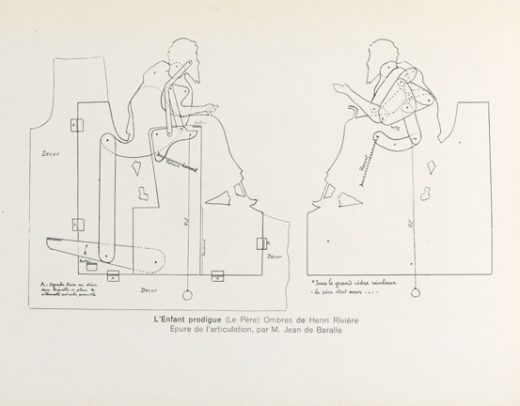
Printed
35 pages
L'Enfant prodigue
Scènes bibliques en 7 tableaux
Immediately after relocating to Rue de Laval, the cabaret du Chat Noir scheduled shadows plays, from 1886 until it closed down in 1897. Two types of plays can be broadly distinguished in its repertory: sung plays – often epic and lyrical – and plays commented by a “bonimenteur” (a barker) – these were more satirical and comical. Thus, like other Parisian cabarets, live entertainment bars and music halls, the Chat Noir offered eclectic programmes, switching between plays of various tones and formats.
After creating La Tentation de Saint-Antoine (1886) and La Marche à l’étoile (1890), poet-composer Georges Fragerolle and painter Henri Rivière collaborated on a third play, L’Enfant prodigue, which dealt again with a biblical theme, based on the Gospel of Luke. The outlines of the parabola, its characters and moral dimension were kept in the show, but Georges Fragerolle expanded the text and made it more poetic, so that it could be accompanied by music and organised into tableaux. He added descriptions, set the story in a more precise location (the “far country” of the Bible is Thebes here) and included scenes which the Gospel of Luke did not mention – such as the scene by the water.
A sinning son repents
The play begins with an old shepherd looking after his flocks and talking briefly with his two sons. While the eldest borrows money that his family has accumulated by working, the youngest announces that he is going to leave, because he longs to live another kind of life. The father replies in the way of a humble man entrusting God with the future of both his wealth and of his youngest son. The next three tableaux show the sinful life of pleasures which the youngest brother enjoys in Thebes before famine and regrets convince him to come back home. The oldest son’s resentment, which the Gospel mentions, is left out of the play. The last tableau does not mention the tensions between the two brothers (which were only suggested at the beginning of the play), and only the father’s joy at being reunited with his son is shown.
First performance
Théâtre du Chat Noir
Publications and translations
FRAGEROLLE Georges (musique et poème), RIVIERE Henri (dessins). L’Enfant prodigue, scène biblique en sept tableaux. Paris, Enoch & Co / E. Flammarion, 1895.